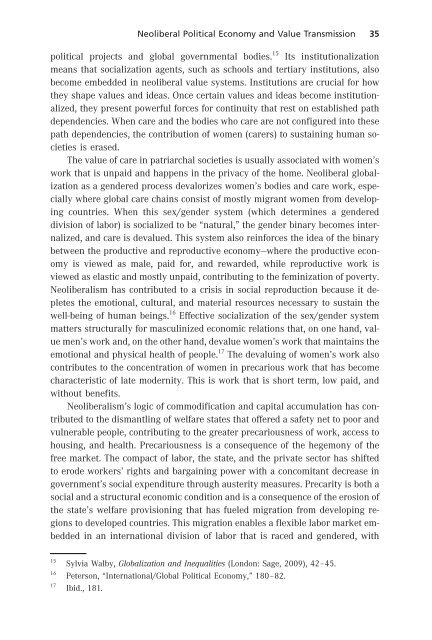Piet Naudé | Michael Welker | John Witte, Jr. (Eds.): The Impact of Political Economy (Leseprobe)
In our late modern pluralistic societies, there are tensions and complementarities between a plurality of individual and social claims and activities to shape societal life and a constructive pluralism of what is known as social systems. The latter provide normative codes and powers emanating from the areas of law, religion, the family, the market, the media, education, academic research, health care, defense and politics. A better understanding and steering of this complex division of powers is crucial for the common good and for freedom and peace. In this volume, a multi-disciplinary team of experts from Germany, Italy, Australia, the UK, the USA, and South Africa bring their conceptual, empirical and historical insights to bear in three broad sections: »The moral dimension of social systems«; »The interaction of religion, law and education with political systems«; and »The moral (mal)-formation evident in case studies on the global financial crisis and social media«.
In our late modern pluralistic societies, there are tensions and complementarities between a plurality of individual and social claims and activities to shape societal life and a constructive pluralism of what is known as social systems. The latter provide normative codes and powers emanating from the areas of law, religion, the family, the market, the media, education, academic research, health care, defense and politics. A better understanding and steering of this complex division of powers is crucial for the common good and for freedom and peace.
In this volume, a multi-disciplinary team of experts from Germany, Italy, Australia, the UK, the USA, and South Africa bring their conceptual, empirical and historical insights to bear in three broad sections: »The moral dimension of social systems«; »The interaction of religion, law and education with political systems«; and »The moral (mal)-formation evident in case studies on the global financial crisis and social media«.
You also want an ePaper? Increase the reach of your titles
YUMPU automatically turns print PDFs into web optimized ePapers that Google loves.
Neoliberal <strong>Political</strong> <strong>Economy</strong> and Value Transmission 35<br />
political projects and global governmental bodies. 15 Its institutionalization<br />
means that socialization agents, such as schools and tertiary institutions, also<br />
become embedded in neoliberal value systems. Institutions are crucial for how<br />
they shape values and ideas. Once certain values and ideas become institutionalized,<br />
they present powerful forces for continuity that rest on established path<br />
dependencies. When care and the bodies who care are not configured into these<br />
path dependencies, the contribution <strong>of</strong> women (carers) to sustaining human societies<br />
is erased.<br />
<strong>The</strong> value <strong>of</strong> care in patriarchal societies is usually associated withwomen’s<br />
work that is unpaid and happens in the privacy <strong>of</strong>the home. Neoliberal globalization<br />
as agendered process devalorizes women’s bodies and care work, especially<br />
where global care chains consist <strong>of</strong> mostly migrant women from developing<br />
countries. When this sex/gender system (which determines agendered<br />
division <strong>of</strong> labor) is socialized to be “natural,” the gender binary becomes internalized,<br />
and care is devalued. This system also reinforces the idea <strong>of</strong> the binary<br />
between the productive and reproductive economy—where the productive economy<br />
is viewed asmale, paid for, and rewarded, while reproductive work is<br />
viewed as elastic and mostly unpaid, contributing to the feminization <strong>of</strong> poverty.<br />
Neoliberalism has contributed to acrisis in social reproduction because it depletes<br />
the emotional, cultural, and material resources necessary to sustain the<br />
well-being <strong>of</strong>human beings. 16 Effective socialization <strong>of</strong> the sex/gender system<br />
matters structurally for masculinized economic relations that, on one hand, value<br />
men’swork and, on the otherhand, devalue women’swork that maintains the<br />
emotional and physical health <strong>of</strong> people. 17 <strong>The</strong> devaluing <strong>of</strong>women’s work also<br />
contributes to the concentration <strong>of</strong> women in precarious work that has become<br />
characteristic <strong>of</strong> late modernity. This is work that is short term, low paid, and<br />
without benefits.<br />
Neoliberalism’s logic <strong>of</strong> commodification and capital accumulation has contributed<br />
to the dismantling <strong>of</strong> welfare states that <strong>of</strong>fered asafety net to poor and<br />
vulnerable people, contributing to the greater precariousness <strong>of</strong> work, access to<br />
housing, and health. Precariousness is aconsequence <strong>of</strong> the hegemony <strong>of</strong>the<br />
free market. <strong>The</strong> compact <strong>of</strong> labor, the state, and the private sector has shifted<br />
to erode workers’ rights and bargaining power with aconcomitant decrease in<br />
government’ssocial expenditure through austerity measures.Precarity is both a<br />
social and astructural economic condition and is aconsequence <strong>of</strong> the erosion<strong>of</strong><br />
the state’s welfare provisioning that has fueled migration from developing regions<br />
to developedcountries.This migration enables aflexible labor market embedded<br />
in an international division <strong>of</strong> labor that is raced and gendered, with<br />
15<br />
16<br />
17<br />
Sylvia Walby, Globalization and Inequalities (London: Sage, 2009), 42–45.<br />
Peterson, “International/Global <strong>Political</strong> <strong>Economy</strong>,” 180–82.<br />
Ibid., 181.
















